
https://www.youtube.com/watch?v=Qifg5hxnlJE
Ketogenic Diet Plan for Beginners - Dr. Berg
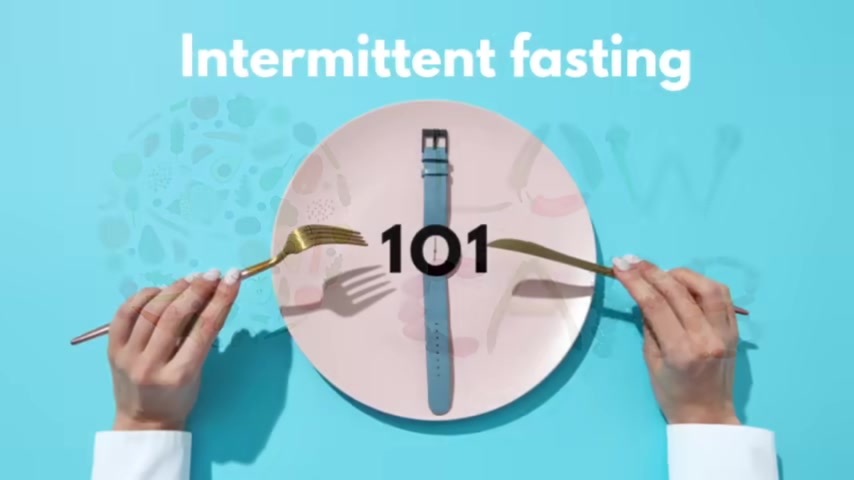
Now I have done a lot of videos on the ketogenic diet , but I wanted to include a new video for beginners with all the updates .
But I want to make it really , really simple .
So let's just start with the basics .
What is a ketone ?
A ketone is not a fat .
It's not a carbohydrate .
It's not a protein .
It's kind of a combination or it has characteristics of both a fat and a carbohydrate , but it's not either .
It comes from fat , but a ketone is an alternative fuel source .
And the way that you get ketones is you simply lower your carbohydrates in your diet or you reduce the frequency of eating .
And this is why we recommend a low carb diet with intermittent fasting .
And that way you can maximize your ability to make ketones .
Ketones have many advantages versus regular glucose fuel .
Number 1 , it will increase your oxygen in your body .
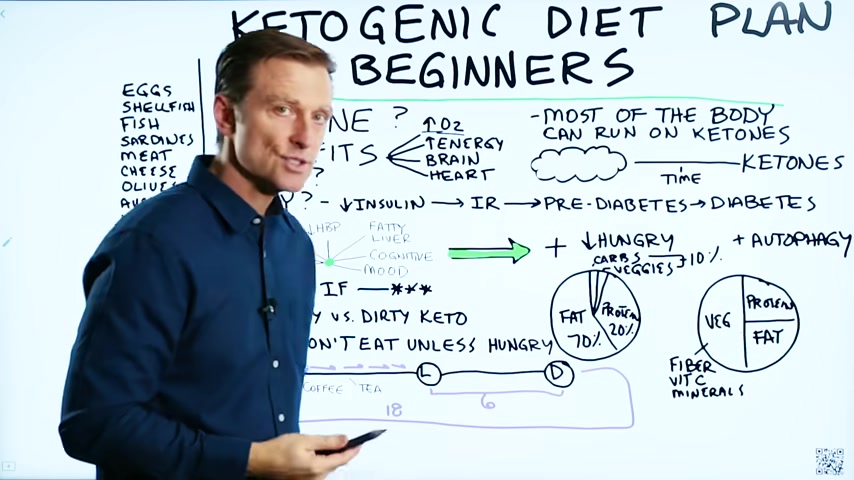
Number 2 , it increases your energy .
Number 3 , it supports the brain .
In fact , your brain prefers ketones over glucose .
Same thing with the heart .
If your heart is damaged or your brain is damaged , ketones are the answer and they can bypass the mechanical damage pathways and feed the tissues directly .
Most of the body tissues can run-in ketones , but some parts need glucose .
And this is the confusion that people have .
They think they need to consume glucose to get glucose .
No .
There's something called gluconeogenesis .
Okay ?
Glucose neo , new genesis , the creation of .
Your body can make glucose if it needs it from fat , ketones , proteins .
You don't need to consume carbohydrates to get glucose .
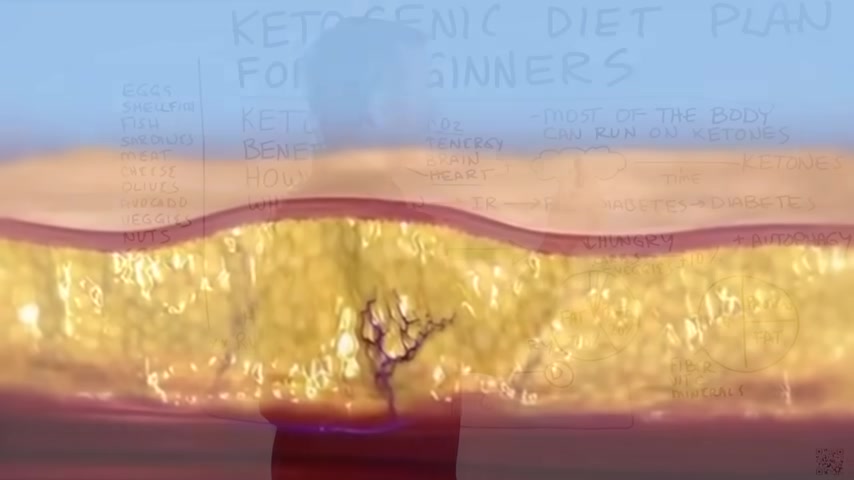
Now it does take time to turn the fat into ketones .
It's gonna take between 3 to 5 days .
It all depends on how damaged insulin is in your body , how damaged your pancreas is .
If you are a prediabetic , if you are a diabetic , if you have insulin resistance , it's gonna take longer and longer to adapt .
But by lowering the carbs and going into intermittent fasting , you'll get there a lot faster .
That explains how to get in ketosis .
You lower the carb and you lower the frequency of eating .
Now why would you wanna do ketosis ?
What what is the big benefit of doing that ?
Well , you're gonna lower insulin and most people have high insulin .
Rarely does your doctor ever test you for insulin .
They'll test you for glucose but not insulin .
If they did , they probably would find higher levels of insulin .

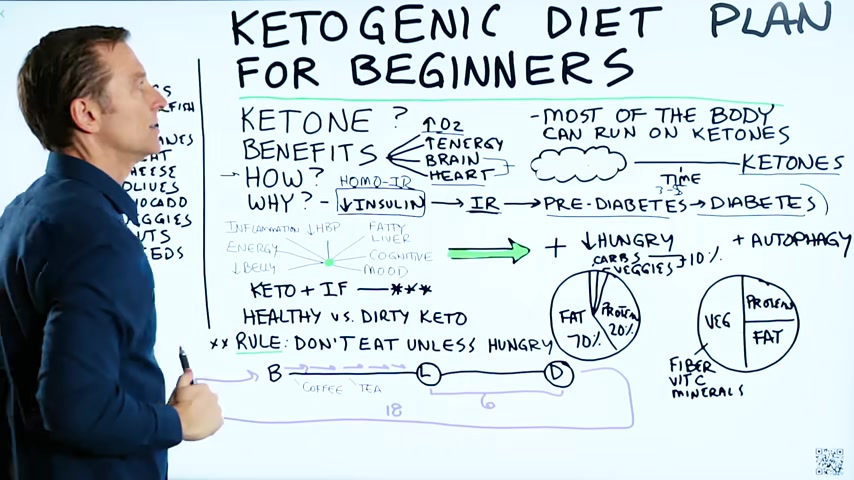
The test that you would wanna do is called HOMADASHIR , and that will pick this up .
Too much insulin causes insulin resistance .
Insulin resistance is behind prediabetes .
Insulin resistance is behind metabolic syndrome , high blood pressure , fat in the gut area right through here .
And prediabetes leads to diabetes .
So in reality , diabetes stems from high levels of insulin at certain point and so keto and intermittent fasting will lower insulin .
And that is the big benefit of doing this .
There's a lot of other benefits too .
You can reduce fat in your liver .
You can improve your cognitive performance .
You can improve your your mood .
You can help decrease blood pressure , decrease inflammation , improve your energy , and decrease your belly fat .
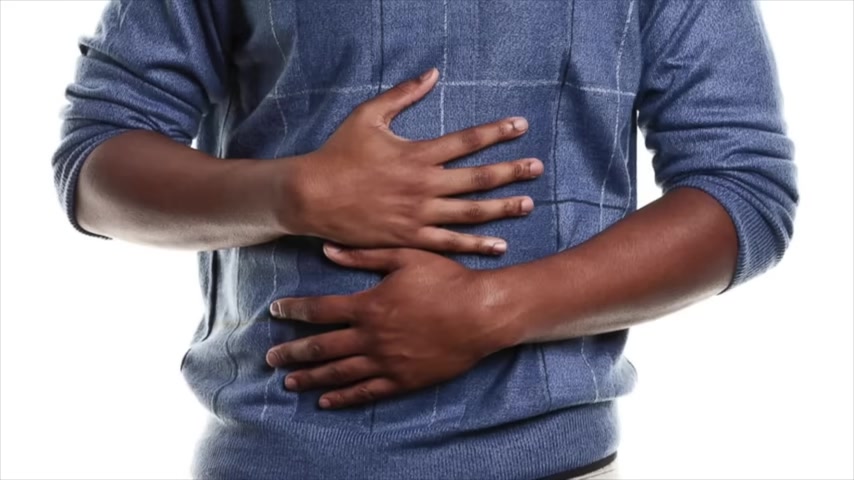
But the real big benefit that allows you to do this eating plan is your hunger goes away .
Okay ?
Without being hungry all the time , it makes it really easy to do long term as a healthy lifestyle .
And there's even additional benefit if you're doing intermittent fasting .
That's autophagy .
Basically what this is , it's a recycling of garbage in your tissues .
So all the damaged protein , the protein that your body doesn't need , it's clogging everything up .
Guess what ?
Your body will recycle that and turn that into new amino acids .
That's one of the big , things about autophagy .
To do this , you have to fast at least for 18 hours .
So the combination of keto and I f work very , very nicely together because if you just do keto without intermittent fasting and your metabolism is slow , you may not achieve your weight loss goal or your other goals .
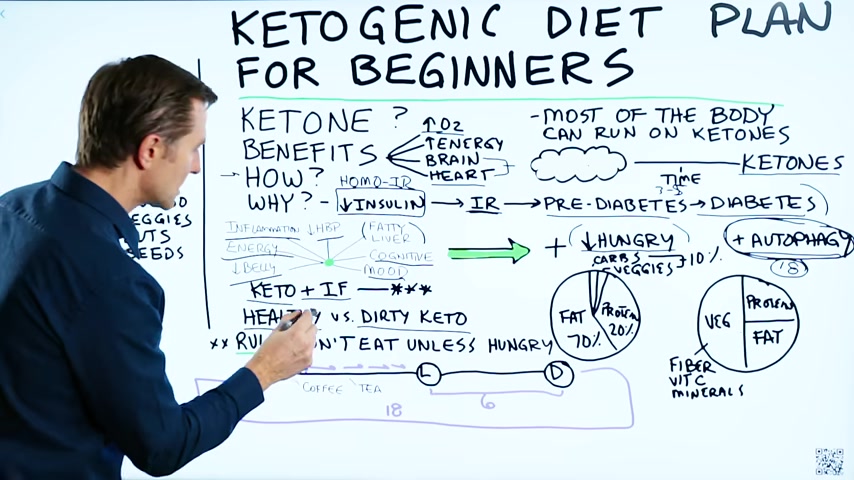
Because it would take a very very long time and sometimes it's not gonna work .
Why ?
Because the frequency of eating in general will trigger insulin .
So the frequency of eating is actually very , very important in relationship to you lowering insulin .
Alright .
Then you have this concept of a healthy keto plan versus dirty keto .
Of course , we recommend the healthy keto .
And this basically is higher quality ingredients , grass fed , wild caught , pasture raised versus conventional type foods right here .
With healthy keto , you're focused on nutrient dense foods .
With dirty keto , you're really just focused on keeping your carbs low .
When you do healthy keto , you end up looking a lot better than doing the dirty keto .
Alright .
The rule of thumb is don't eat unless you have hunger .
Okay ?
Unless you have the sensation of being hungry .

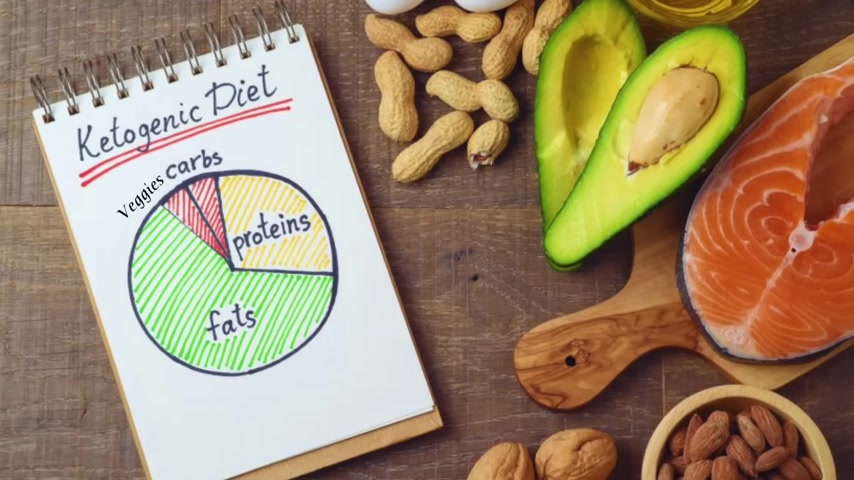
When you're doing the healthy version of keto and you're doing enough leafy greens and vegetables , okay , and you're doing enough healthy fats , and you're improving insulin resistance , you're not only gonna be full , but you're gonna be satisfied .
Now if you look at the pie chart here , we have about 5% carbs of your total calories and then 5% vegetables , which by the way actually adds up to a lot because if you look at the carbohydrates in vegetables , you minus the fiber giving the net carb .
It doesn't come out to a lot of calories .
So if we look at the total carbs which would include like berries , hummus , nuts and seeds .
There's a little bit of carbs in those .
And you combine the vegetables , that's like 10% .
Then we have 20% protein and then we have 70% fat .
Now the fat looks like a lot but realize fat is basically double the calories of other macronutrients .
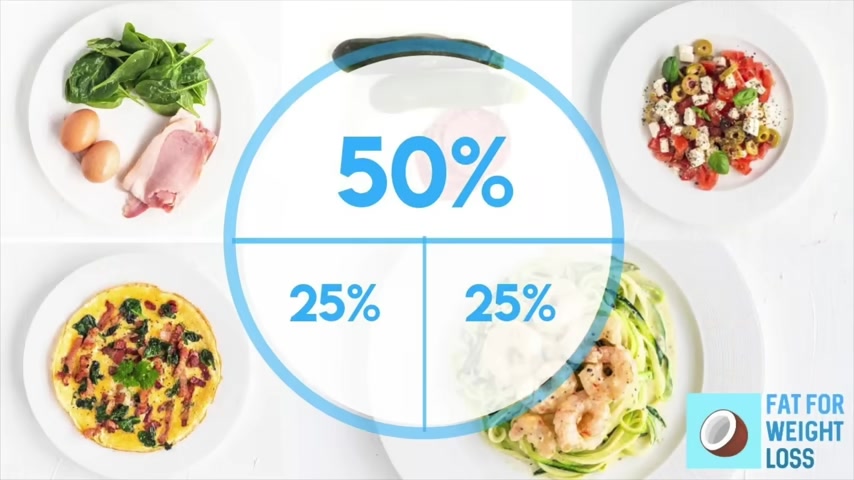
But if we actually look at an actual plate with your food on the plate , if you just look at it like this , to keep it really simple , half the plate vegetables .
Okay ?
A quarter would be protein and a quarter would be fat .
But because protein and fat usually come together , that's gonna be pretty much half your plate .
That's what it should look like .
The benefit of the vegetables are the vitamin c , the minerals , other nutrients and phytonutrients .
Okay .
I'm going through this really fast but I'm just giving you a summary .
In the next few videos which I'm gonna put a link down below , I'm gonna talk more about exactly what to eat when you're eating .
But I wanted to give you the simple overview of all the most important things .
So now let's just put it all together .
Ideally , when you wake up in the morning , if you keep your carbs low , you're not gonna be hungry .
So you wanna skip breakfast and push it forward to the point where your breakfast now becomes your lunch .
So don't eat in the morning .
You can do coffee or tea .
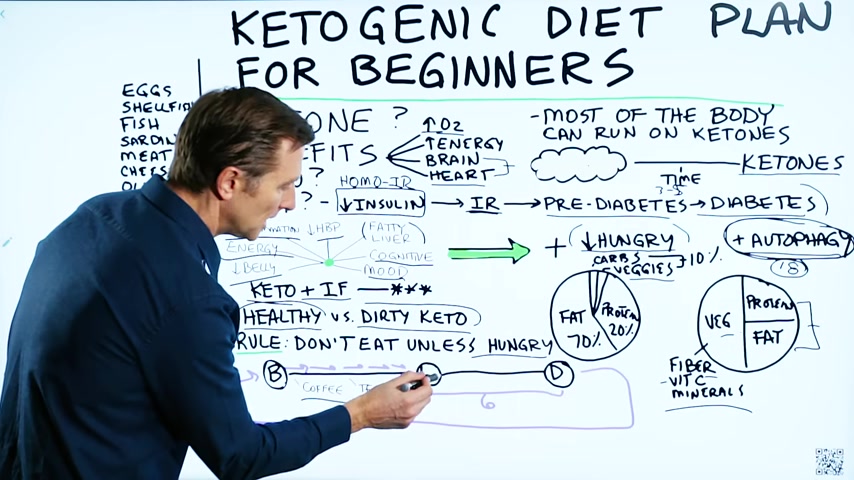
So ideally , your first meal would be at lunch right here .
And then your second meal would be at dinner .
So you're doing 2 meals a day .
If you keep this within a 6 hour window , that will give you an 18 hour fast .
Now what's really magical about 18 hours is that's when the autophagy starts .
So you start getting some really cool benefits .
The way that you're gonna avoid snacking between the meals is you're gonna add a little more fat with this meal and this meal to be able to go longer .
K ?
And then as you start doing it and becoming more adapted , you can kinda cut back on some of the fat because you're gonna be burning your own fat .
And your own fat is the healthiest fat that you can burn .
But the key is this 18 hour fast right here .
If you have to snack within your eating window , fine if you need to do that .
But we don't wanna snack after the dinner all the way to the next , first meal .

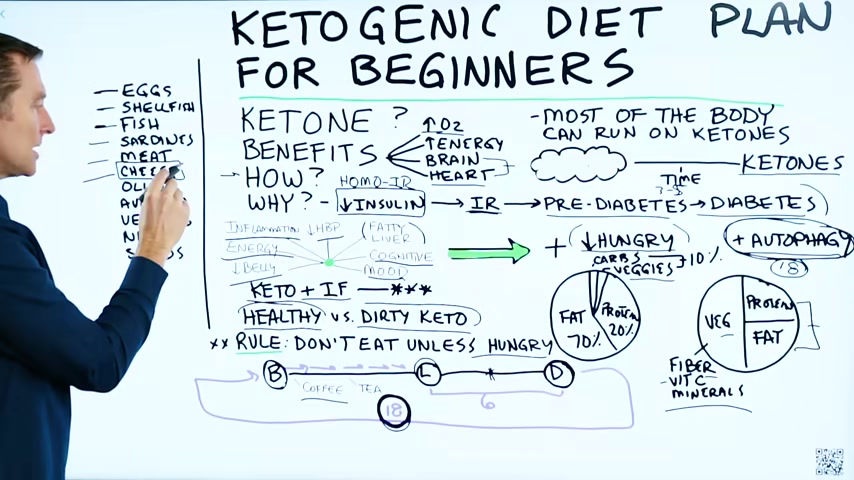
You can drink fluids .
You wanna take electrolytes and b vitamins for sure and sea salt .
That's a necessity but we recommend that you don't eat anything .
The common foods that are really good to focus on would be pasture raised eggs .
Okay .
Organic if at all possible .
Shellfish , fish , sardines , meats , organic , cheese .
Now a lot of people don't do well in cheese .
Cheese has a lot of hormones .
It's not good for people with prostate issues .
It's not good with people that have allergies .
So some people do not do well in cheese .
Personally , I do a small amount of cheese .
And if I'm gonna consume cheese , it has to be grass fed organic .
I usually get European cheese and I don't have a tremendous amount , but you can overdo it with cheese .
Olives , that's a must .
Avocados , lots of vegetables .
7 to 10 cups , very beneficial .
Nuts , for some people they don't do well on that .
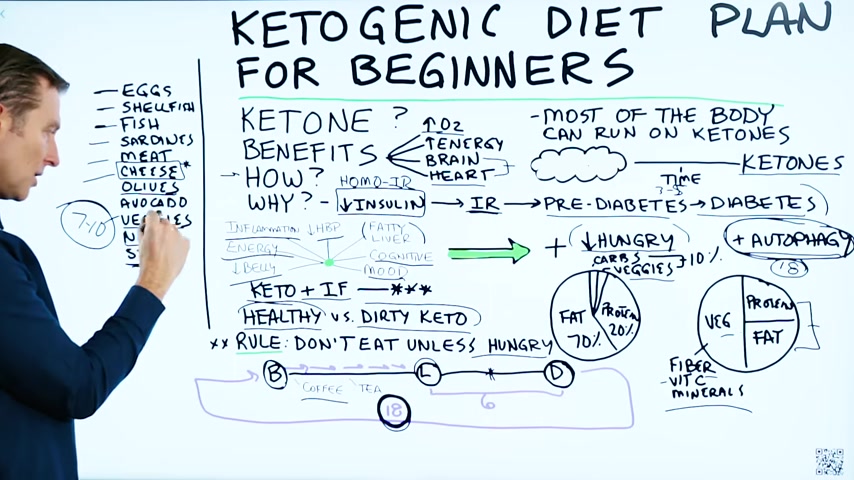
Especially if they're prone to kidney stones , you have to be careful with almonds .
Okay .
As well as spinach .
So I'd avoid those if you're prone to kidney stones .
Also seeds like sunflower seeds , perfect on a ketogenic plan .
Alright .
Here you have it .
The basic ketogenic plan for beginners .
So if you want more knowledge on how to create a healthy body , subscribe now and get daily notifications .
Are you looking for a way to reach a wider audience and get more views on your videos?
Our innovative video to text transcribing service can help you do just that.
We provide accurate transcriptions of your videos along with visual content that will help you attract new viewers and keep them engaged. Plus, our data analytics and ad campaign tools can help you monetize your content and maximize your revenue.
Let's partner up and take your video content to the next level!
Contact us today to learn more.